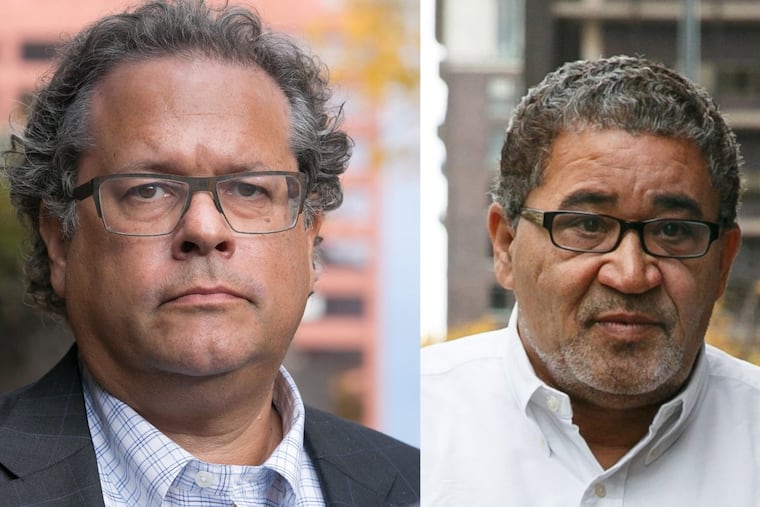Brady's 2 indicted strategists come out swinging after hearing
As for the question circling both Ken Smukler and Donald "D.A." Jones since they were charged Tuesday - whether the indictment might convince either to reverse course, agree to cooperate, and lead investigators one step closer to Brady - Smukler lawyer Brian McMonagle sent a clear signal with his statements.

U.S. Rep. Robert Brady's two indicted political strategists put forth a united front Wednesday, denying that they had committed crimes and vowing to give prosecutors a bruising fight at trial.
Making their first appearance in federal court, Ken Smukler, 57, and Donald "D.A." Jones, 62, pleaded not guilty to charges that they had conspired to hide a $90,000 payment from Brady's campaign five years ago to persuade a primary challenger to drop out of the race.
Speaking after the hearing, their lawyers did not deny that both men helped shepherd money to Brady's opponent – former Philadelphia Municipal Court Judge Jimmie Moore – in 2012 but maintained that neither had done anything illegal.
As for the question circling Smukler and Jones since they were charged Tuesday – whether the indictment might persuade either to reverse course, agree to cooperate, and bring investigators a step closer to Brady – Smukler lawyer Brian McMonagle sent a clear signal with his statements.
"It's not going to stop Ken or make him bend in any way," McMonagle said. "He will continue to be vigilant in looking out for and protecting people who have been victimized by political prosecutions."
Brady, a congressman for nearly two decades — and chairman of Philadelphia's Democratic City Committee for a decade longer than that — has not been charged with a crime, and prosecutors have not indicated whether they intend to pursue a case against him.
At the brief hearing Wednesday, Smukler and Jones were ushered in wearing handcuffs as well as their dress shirts and business slacks, among a crowd of other defendants who filled the daily docket – a collection of alleged drug dealers in prison jumpsuits.
After entering their pleas, both men were released, agreeing to pay $50,000 should they fail to show up to future court hearings or attempt to contact potential witnesses in the case.
Both received special permission to continue to work with Brady while they remained under indictment – which Brady advisers said the congressman was encouraged to hear.
That marked a stark change from the last time Smukler became ensnared in a campaign finance controversy while working for Brady – a 2007 imbroglio over conversations the strategist had about starting a "527 group" while working for Brady's campaign for mayor of Philadelphia that year.
Named for the section of tax code that governs them, such groups are permitted to raise and spend political money freely, unlike candidates, who are subject to contribution limits. But campaign finance laws bar candidates and their staffs from dealing directly or coordinating efforts with such groups.
Smukler admitted at the time that he had preliminary discussions about starting a group to attack a Brady rival in the mayoral race. He immediately resigned from Brady's mayoral campaign, but maintained that he had done nothing improper.
In the current case, prosecutors allege that Smukler and Jones conspired to violate federal campaign finance laws by shepherding a $90,000 payoff to Moore in 2012 that was well in excess of a $2,000 cap on candidate-to-candidate contributions in primary races.
The indictment alleges the strategists funneled the money from Brady's campaign coffers to Moore's by routing it through their own consulting firms.
Moore's former campaign manager, Carolyn Cavaness, has said Smukler directed her to file false invoices from a consulting firm she set up solely to receive the money from Brady's coffers.
Both Moore and Cavaness have pleaded guilty to lying to the Federal Election Commission and are cooperating with the investigation.
Smukler and Jones maintain that the money they paid was meant to obtain exclusive rights to polling data Moore had commissioned before dropping out of the race.
Leaving court Wednesday, Jones' lawyer, Robert Trimble, described the government's case as thin.
"Overreach would be an understatement," he said. "All of my client's business with the congressman or any other client has been legitimate and aboveboard. He's done nothing wrong."
CORRECTION: An earlier version of this story incorrectly reported that Cavaness claimed that Smukler had instructed her to set up the consulting firm through which she received money from Brady's campaign. Cavaness has said it was Moore who told her to create the company. Smukler, she has said, instructed her to file false invoices from it.